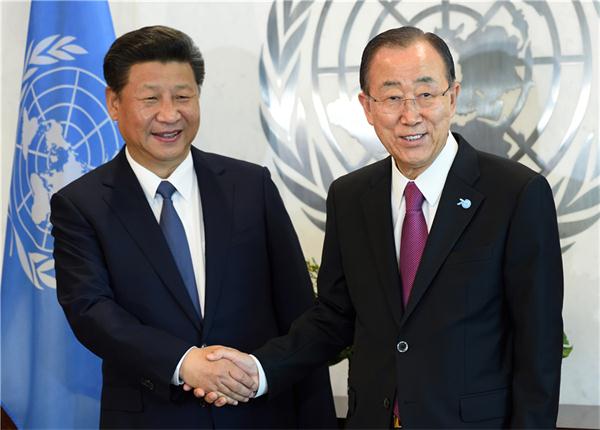The goal is world peace through cooperation
By CHEN XIANGYANG (China Daily) Updated: 2015-09-28 07:46
 |
|
Chinese President Xi Jinping, left, meets with United Nations Secretary-General Ban Ki-moon on September 26, 2015, at the United Nations in New York. [Photo/Agencies] |
President Xi Jinping's state visit to the United States and participation in United Nations meetings to commemorate the 70th anniversary of the founding of the world organization and the world's victory against fascism have drawn widespread attention because of China's growing influence across the globe.
China has been fulfilling its international responsibilities and has emerged as a staunch defender of the existing world order. It did not only fight shoulder to shoulder with other countries to defeat fascism seven decades ago, but also had 35 million casualties in that fight for justice and peace. Thanks to its huge contributions to the fight against fascist forces, China became a founding member of the UN and, later, a permanent member of the Security Council.
Having joined almost all the more than 400 intergovernmental organizations and multilateral treaties, China has emerged as one of the most important participants and supporters of the current world order. It has also made clear its goal of helping remove the discrepancies in the existing international organizations and work with the rest of the world to promote inclusive development in a fairer way.
Beijing has been firmly defending peace and stability in the Asia-Pacific region, based on its diplomatic principle of friendship, reciprocity and good-neighborly relations. Contrary to accusations of some Western politicians and observers, Beijing doesn't want to widen its influence; instead it wants to help build a community of shared destiny and interests.
For example, the China-proposed Belt and Road Initiative is aimed at creating opportunities for countries to pursue common development rather than scrambling for dominance. And the establishment of the China-led Asian Infrastructure Investment Bank is aimed at helping economies, especially developing economies, get funds in time for development projects without strict conditions, because existing international financial institutions do not always issue loans without strict terms. Thus, the AIIB will play a supplementary role to the existing global financial institutions.
Besides, Beijing's reclamation projects on its own islands and reefs in the South China Sea are not targeted at other countries; they are aimed at facilitating free navigation, which is part of its obligations as a responsible regional power.
Beijing has also made vigorous efforts to push for the political settlement of burning global and regional issues. As a permanent member of the UN Security Council, it has been working to safeguard peace and justice. It has helped resolve the Iranian nuclear issue, and has been working with other countries to settle the Syrian and other Middle East conflicts. And as an initiator of the Six-Party Talks, Beijing has made every possible effort to help denuclearize the Korean Peninsula.
On the peacekeeping front, Beijing has been dispatching an increasing number of personnel on UN missions. Since 1989, it has sent about 31,000 personnel on 29 UN peacekeeping missions. And in 2005, China for the first time sent a police squad to Haiti to help maintain social order, which was followed by the dispatch of an infantry battalion on a peacekeeping mission to South Sudan in 2015.
Moreover, China has also made great efforts to promote global development and cooperation. In fact, it is the first country to complete the UN Millennium Development Goals, lifting 439 million people out of poverty in the process. And its deepening reforms to maintain a stable but healthy economic growth is aimed at helping the world economy fully recover from the global financial and economic crisis.
Also, China has participated in UN projects on sustainable development, climate change, humanitarian assistance and disaster relief and offered 400 billion yuan ($62.69 billion) in aid to 166 countries and regions.
At the UN meetings, President Xi has elaborated on all these initiatives to promote global development and cooperation in order to advance the post-2015 UN development agenda.
China will continue to follow an independent foreign policy that adheres to peaceful development. It will also pursue democratization of international relations pushing for a "cooperative and win-win" approach instead of "zero-sum game" in order to continue contributing to world peace and development.
The author is a research fellow at and deputy director of the Institute of World Politics, China Institutes of Contemporary International Relations.

I’ve lived in China for quite a considerable time including my graduate school years, travelled and worked in a few cities and still choose my destination taking into consideration the density of smog or PM2.5 particulate matter in the region.











